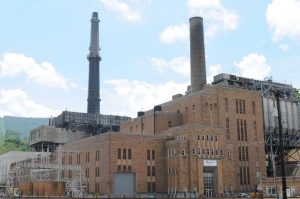 The advisory panel that will develop a carbon reduction program for Virginia power plants held its first meeting last week. The panel is tasked with developing a draft regulation that would cap greenhouse gas emissions from Virginia’s fossil fuel generating facilities for the first time ever. The advisory panel, appointed by Governor McAuliffe, includes environmental advocates, utility representatives, and renewable energy developers. Preston Bryant, who served as Virginia’s Secretary of Natural Resources under Governor Tim Kaine, will serve as a moderator.
The advisory panel that will develop a carbon reduction program for Virginia power plants held its first meeting last week. The panel is tasked with developing a draft regulation that would cap greenhouse gas emissions from Virginia’s fossil fuel generating facilities for the first time ever. The advisory panel, appointed by Governor McAuliffe, includes environmental advocates, utility representatives, and renewable energy developers. Preston Bryant, who served as Virginia’s Secretary of Natural Resources under Governor Tim Kaine, will serve as a moderator.
The panel’s work was set in motion in May, when Virginia Governor Terry McAuliffe issued an executive action directing the Virginia Department of Environmental Quality (“DEQ”) to draft a regulation restricting the emission of carbon dioxide from electric generating facilities. Executive Directive 11 ordered DEQ to draft a regulation pursuant to Va. Code §§ 10.1-1300, et seq. that will “abate, control, or limit carbon dioxide emissions from electric power facilities.” The directive states that DEQ must propose a regulation that is “trading ready” and will allow for the exchange of carbon emissions allowances with other states.
The panel’s first job will be to determine how to structure a program where carbon credits or allowances can be traded among emitters. One option for a “trading ready” program would be for Virginia to join the existing Regional Greenhouse Gas Initiative (“RGGI”). RGGI is a regional carbon “cap and trade” program with nine northeast member states. Under RGGI, carbon allowances can be bought and sold at auctions, and the auction revenues can result in income for member states. However, the Virginia General Assembly would likely have to approve Virginia’s participation in RGGI. The General Assembly would also likely have to approve any carbon allowance trading program that results in revenues for the Commonwealth, as State agencies are generally prohibited from enacting revenue raising programs without legislative approval.
The Governor’s directive was issued at the same time that the federal Clean Power Plan, a greenhouse gas regulation promulgated by the EPA during the Obama administration, is under legal challenge and subject to a stay by the U.S. Supreme Court. The Trump administration has also indicated that it will attempt to suspend or repeal the Clean Power Plan.
Under the Governor’s executive directive, the advisory panel has until December 31, 2017, to present the proposed regulation to the Virginia State Air Pollution Control Board, which would then open up the proposed rule for public comment. Please contact one of our renewable energy lawyers or regulatory attorneys should you have questions about this matter.


No Comments